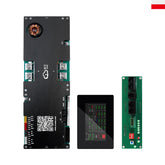The Ultimate Guide to Battery Group 51R Everything You Need to Know
The Complete Guide to Battery Group 51R Everything You Need to Know
- What is Battery Group 51R?
- Key Features of Battery Group 51R
- How to Choose the Right Battery Group 51R for Your Vehicle
- Installing Battery Group 51R
- Benefits of Choosing Battery Group 51R
- Common Issues with Battery Group 51R
When it comes to choosing the right car battery, understanding the specifications and details of different battery groups is crucial. The Battery Group 51R is one such option that often comes up for many drivers. In this complete guide, we will walk you through everything you need to know about Battery Group 51R, from its specifications and uses to how it compares to other battery groups. Whether you're replacing an old battery or just learning about your options, this guide will provide all the essential information you need.
What is Battery Group 51R?
The Battery Group 51R is a type of automotive battery that falls under the Group 51 classification. This group is primarily used in smaller vehicles such as compact cars, sedans, and hatchbacks. The "51" in the name refers to the battery's physical dimensions, while the "R" indicates that the battery has a reverse terminal placement compared to other standard batteries.
The Battery Group 51R is commonly used for vehicles that require a smaller, more compact battery while still offering adequate cranking power. This makes it a popular choice for a wide range of vehicles, including some Honda, Toyota, and Nissan models.
Key Features of Battery Group 51R
Before making a decision, it's important to understand the core features of Battery Group 51R. Here are some of the most notable aspects:
1. Size and Dimensions
The Battery Group 51R is typically 9.1 inches in length, 5.1 inches in width, and 8.5 inches in height. The "51" dimension refers to the battery's physical size, while the "R" indicates that the battery terminals are reversed compared to standard Group 51 batteries.
2. Amp Hour Rating
The Battery Group 51R generally has an amp-hour (Ah) rating between 35 and 40 Ah, which indicates the amount of charge the battery can store and how long it can power a vehicle's electrical components without the engine running. A higher Ah rating means a longer runtime.
3. Cold Cranking Amps (CCA)
The Cold Cranking Amps (CCA) rating is a critical factor for battery performance, especially in cold climates. CCA measures the battery's ability to start an engine in low temperatures. The Battery Group 51R typically has a CCA rating between 400 and 600, making it suitable for moderate climates and vehicles with standard engine sizes.
4. Voltage
Like most automotive batteries, the Battery Group 51R operates at a nominal voltage of 12 volts. This is the standard voltage for most passenger vehicles.
>>See also Drawbacks of the EcoFlow Delta A Complete Review
How to Choose the Right Battery Group 51R for Your Vehicle
When selecting a Battery Group 51R, there are several factors to consider to ensure that the battery fits your vehicle’s needs. Here are some key points to keep in mind:
1. Vehicle Compatibility
Make sure the Battery Group 51R is compatible with your vehicle. Check your vehicle’s owner manual for the recommended battery size, and verify that the Group 51R is the right match for your car’s engine and electrical requirements.
2. Climate Considerations
If you live in a particularly cold region, you may want to look for a Battery Group 51R with a higher Cold Cranking Amps (CCA) rating. This will help ensure reliable starting performance even in freezing temperatures.
3. Battery Brand and Warranty
Choose a reputable battery brand with a solid warranty. Many well-known brands, such as Optima, ACDelco, and Interstate, offer Battery Group 51R options with excellent warranties and customer service. Always check the warranty period and terms before making your purchase.
4. Maintenance Needs
Some Battery Group 51R options are maintenance-free, while others may require periodic maintenance such as checking fluid levels and cleaning terminals. Consider your preference for maintenance when making your decision.
Installing Battery Group 51R
Installing a Battery Group 51R is typically a straightforward process, but it’s important to follow the correct steps to avoid damaging your vehicle or the battery. Here’s a general step-by-step guide for installing the Battery Group 51R:
1. Preparation
Ensure that your vehicle is turned off and that the keys are removed from the ignition. You may also want to wear gloves and safety glasses to protect yourself during the installation process.
2. Disconnect the Old Battery
Start by disconnecting the negative terminal (marked with a “-”) first, followed by the positive terminal (marked with a “+”). This helps avoid short circuits during the removal process.
3. Remove the Old Battery
Carefully remove the old battery from its compartment. It may be held in place with a bracket or strap, so you may need to use a wrench to remove any bolts securing the battery.
4. Install the New Battery
Place the Battery Group 51R into the battery tray, ensuring that the terminals are positioned correctly. Remember, the 51R has reverse terminals, so the positive terminal will be on the side closest to the vehicle’s engine. Secure the battery with the bracket or strap.
5. Reconnect the Terminals
Reconnect the positive terminal first, followed by the negative terminal. Tighten the connections to ensure a secure fit, but avoid over-tightening, which could damage the battery terminals.
6. Test the Battery
Start the vehicle to ensure the new Battery Group 51R is working properly. If the car starts without issues, the installation is complete.
Benefits of Choosing Battery Group 51R
There are several advantages to choosing a Battery Group 51R for your vehicle:
1. Compact and Lightweight
The Battery Group 51R is smaller and lighter than many other battery groups, making it ideal for vehicles with limited space in the engine bay.
2. Reliable Performance
Despite its compact size, the Battery Group 51R delivers reliable starting power and long-lasting performance, making it a great option for everyday drivers.
3. Cost-Effective
Compared to larger battery groups, the Battery Group 51R is often more affordable, offering excellent value for money without compromising on performance.
Common Issues with Battery Group 51R
While the Battery Group 51R is a great option for many vehicles, there are some common issues to be aware of:
1. Limited Cold Weather Performance
If you live in an area with extremely cold winters, the Battery Group 51R may not offer enough Cold Cranking Amps (CCA) for optimal performance. In such cases, you may need to consider a different battery with a higher CCA rating.
2. Shorter Lifespan in Some Cases
Although the Battery Group 51R is generally reliable, its lifespan can be shorter than larger batteries, particularly if it’s subjected to extreme weather conditions or high electrical demands.
3. Compatibility with Larger Vehicles
The Battery Group 51R is not suitable for larger vehicles with bigger engines, such as trucks or SUVs. These vehicles typically require larger battery groups with higher capacity and power output.
>>See also Convert Watt Hours to Milliamp Hours Easily
The Battery Group 51R is an excellent choice for compact cars and sedans that require a reliable, cost-effective battery. By understanding the key features, installation process, and potential issues with Battery Group 51R, you can make an informed decision about whether this battery is the right fit for your vehicle. If you're looking for a smaller, efficient battery that offers solid performance, the Battery Group 51R could be the perfect option for you.
When selecting a new battery, always consider the specifications and choose a high-quality brand with a good warranty to ensure you get the most out of your Battery Group 51R. Keep these tips in mind, and you'll enjoy a smooth and reliable driving experience.

























Leave a comment
All blog comments are checked prior to publishing